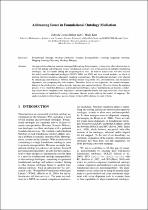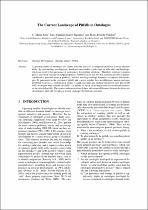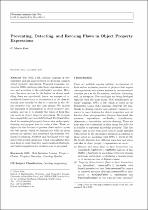JavaScript is disabled for your browser. Some features of this site may not work without it.
- ResearchSpace
- →
- Research Publications/Outputs
- →
- Conference Publications
- →
- View Item
| dc.contributor.author |
Dawood, Zubeida C

|
|
| dc.contributor.author |
Keet, CM

|
|
| dc.date.accessioned | 2013-11-08T05:54:57Z | |
| dc.date.available | 2013-11-08T05:54:57Z | |
| dc.date.issued | 2013-09 | |
| dc.identifier.citation | Khan, Z.C and Keet, C.M. 2013. Addressing issues in foundational ontology mediation. In: 5th International Conference on Knowledge Engineering and Ontology Development (KEOD'13), Algarve, Portugal, 19-22 September 2013 | en_US |
| dc.identifier.uri | http://www.meteck.org/files/KEOD13KKalign.pdf | |
| dc.identifier.uri | http://hdl.handle.net/10204/7043 | |
| dc.description | 5th International Conference on Knowledge Engineering and Ontology Development (KEOD'13), Algarve, Portugal, 19-22 September 2013 | en_US |
| dc.description.abstract | An approach in achieving semantic interoperability among heterogeneous systems is to offer infrastructure to assist with linking and integration using a foundational ontology. Due to the creation of multiple foundational ontologies, this also means linking and integrating those ones. In order to achieve this, we have selected the widely used foundational ontologies DOLCE, BFO, and GFO, and their related modules, on which to perform ontology mediation (alignment, mapping, and merging). The foundational ontologies were aligned by identifying correspondences between ontology entities using seven tools, documentation, and our manual alignments, and comparing their effectiveness. Thereafter, based on the alignments, we created correspondences in the ontology files resulting in entity mappings and merged ontologies. However, during the mapping process, it was found that differences in foundational ontologies, such as their hierarchical structure, conflicting axioms due to complement and disjointness, and incompatible domain and range restriction, cause logical inconsistencies in foundational ontology alignments, thereby greatly reducing the number of mappings. We analyse and present these logical inconsistencies with possible solutions to some of them. | en_US |
| dc.language.iso | en | en_US |
| dc.relation.ispartofseries | Workflow;11740 | |
| dc.subject | Foundational ontology | en_US |
| dc.subject | Ontology mediation | en_US |
| dc.subject | Semantic interoperability | en_US |
| dc.subject | Ontology alignment | en_US |
| dc.subject | Ontology mapping | en_US |
| dc.subject | Ontology matching | en_US |
| dc.subject | Ontology merging | en_US |
| dc.title | Addressing issues in foundational ontology mediation | en_US |
| dc.type | Conference Presentation | en_US |
| dc.identifier.apacitation | Khan, Z., & Keet, C. (2013). Addressing issues in foundational ontology mediation. http://hdl.handle.net/10204/7043 | en_ZA |
| dc.identifier.chicagocitation | Khan, ZC, and CM Keet. "Addressing issues in foundational ontology mediation." (2013): http://hdl.handle.net/10204/7043 | en_ZA |
| dc.identifier.vancouvercitation | Khan Z, Keet C, Addressing issues in foundational ontology mediation; 2013. http://hdl.handle.net/10204/7043 . | en_ZA |
| dc.identifier.ris | TY - Conference Presentation AU - Khan, ZC AU - Keet, CM AB - An approach in achieving semantic interoperability among heterogeneous systems is to offer infrastructure to assist with linking and integration using a foundational ontology. Due to the creation of multiple foundational ontologies, this also means linking and integrating those ones. In order to achieve this, we have selected the widely used foundational ontologies DOLCE, BFO, and GFO, and their related modules, on which to perform ontology mediation (alignment, mapping, and merging). The foundational ontologies were aligned by identifying correspondences between ontology entities using seven tools, documentation, and our manual alignments, and comparing their effectiveness. Thereafter, based on the alignments, we created correspondences in the ontology files resulting in entity mappings and merged ontologies. However, during the mapping process, it was found that differences in foundational ontologies, such as their hierarchical structure, conflicting axioms due to complement and disjointness, and incompatible domain and range restriction, cause logical inconsistencies in foundational ontology alignments, thereby greatly reducing the number of mappings. We analyse and present these logical inconsistencies with possible solutions to some of them. DA - 2013-09 DB - ResearchSpace DP - CSIR KW - Foundational ontology KW - Ontology mediation KW - Semantic interoperability KW - Ontology alignment KW - Ontology mapping KW - Ontology matching KW - Ontology merging LK - https://researchspace.csir.co.za PY - 2013 T1 - Addressing issues in foundational ontology mediation TI - Addressing issues in foundational ontology mediation UR - http://hdl.handle.net/10204/7043 ER - | en_ZA |









